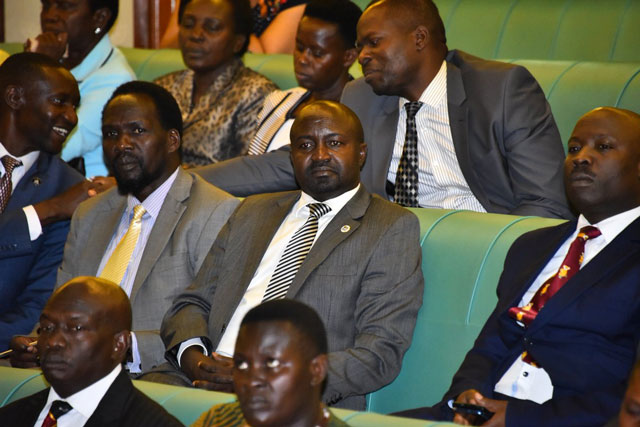
Kampala, Uganda | THE INDEPENDENT | Kassanda North MP Patrick Nsamba Oshabe was on Wednesday allowed to table a private members bill, without a certificate of financial implication.
Parliament Rules of Procedure provide that all Bills introduced in the house shall be accompanied by a Certificate of Financial Implication issued by the Finance Minister. The certificate is a key tool to indicate the impact of the Bill on the economy and estimates of revenue and expenditure over the period of not less than two years after the coming into effect of the Bill.
Private members are also restricted from presenting bills that impose a charge on the consolidated fund or any other public fund of Uganda. But the ministry of finance has been accused of using the provision to frustrate private members from tabling bills in Parliament.
In December 2018, the Speaker of Parliament Rebecca Kadaga warned that she would waive the requirement if the finance officials continued using it to deliberately frustrate members.
Nsamba was the first beneficiary of the move when Kadaga allowed him to table the draft in line with rule 117 of parliament’s rules of procedure. The rule stipulates that a certificate of financial implication shall be deemed to have been issued after 60 days from the date of the request.
Nsamba was granted leave of parliament on February 23, 2017, to introduce a Bill seeking to promote Ugandan goods, services and industrialists. The objective of the Bill is to guarantee priority and exclusive use of locally manufactured goods and services in all projects where the government is a party.
The proposed legislation also seeks to provide for the establishment of a national Local Content Committee and to maximize value-addition and job creation using local expertise, goods and services.
However today, Nsamba told parliament that his pursuit for a certificate of financial implication had hit a dead end. He said that he had formally written to the Finance Minister Matia Kasaija through the Clerk to Parliament, seeking for a certificate but it took more than 60 days to get a reply.
Nsamba says that after the 60 days, he wrote back to the Clerk to Parliament requiring for publication of the Bill, and this is when he received information that the minister had written on September 19, 2018, indicating that his ministry was not providing a certificate for his Bill.
Nsamba appealed that the Bill be handled expeditiously to cater for issues of local content in the country. The Speaker sent it to the Legal and Parliamentary Affairs committee for consideration.
The constitution requires that the member moving the private member’s bill be afforded reasonable assistance from the department of Government whose area of operation the bill affects and by the office of the Attorney General. However, a number of bills have in the recent past been frustrated.
In 2015, National Resistance Movement (NRM) party MPs blocked a request by the then Buikwe South MP, Lulume Bayiga to table a Private Members’ Bill on Presidential Transition. The Bill sought to, among others, make provisions for the procedure and ceremony for the assumption of the office of the President.
However, the majority NRM MPs denied Bayiga a chance to present the Bill while the then-deputy Attorney General, Fred Ruhindi and then minister for Lands Daudi Migereko, argued that the issue was under discussion within the Inter-Party Organisation for Dialogue (IPOD).
Recently, efforts by Mukono Municipality MP Betty Nambooze to present the Alcohol Control Bill were frustrated when she was advised to work with the government to come up with another bill. The proposed Minimum Wage Bill by Worker’s MP Arinaitwe Rwakajara was also delayed due to the financial implications involved.
In 2015, Ayivu County MP Bernard Atiku’s Children Amendment Bill was passed after a long struggle with the government which at some point tabled a parallel draft with similar contents. Both bills were sent to the Gender Committee before it was agreed to proceed with Atiku’s Bill.
****
URN
 The Independent Uganda: You get the Truth we Pay the Price
The Independent Uganda: You get the Truth we Pay the Price



